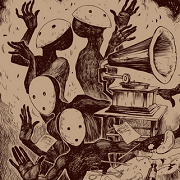(Thread IKs:
dead gay comedy forums)
|
AnimeIsTrash posted:The imperial core rules. We get excited for unions for magazine who's sole point is to get people to consume more products. more people have heard of the Amazon Labor Union and Starbucks Workers United than have heard of Wirecutter at all and the workers in those sectors aren't confused about what they do. the recent joke from Starbucks workers is that the are being over worked so adults can get their morning milkshakes.
|
|
|
|

|
| # ? Jun 13, 2024 03:45 |
|
Atrocious Joe posted:more people have heard of the Amazon Labor Union and Starbucks Workers United than have heard of Wirecutter at all Who are you arguing against? I was just making a joke.
|
|
|
|
jokes? in a dead comedy forum? wtf?
|
|
|
|
animist posted:This is sorta ahistorical. Abstract credit systems were invented thousands of years before metal currency, e.g. in Sumeria and Egypt. I appreciate Graeber's efforts on this and also your effortpost but I've found applying Debt here tends to lead to angles that may not necessarily apply, since Marx was discussing the formation of the logic of capital from the first principles of commodity exchange, and not so much the history of all human commercial intercourse. Commodity exchange itself on these terms wasn't a structuring part of early civilizations' internal logic, but the form was more present at the margins -- outsiders who didn't have persistent roots in a community, or trade between societies/towns/regions, or (as Graeber also notes) in terms of war spoils and general army-raising activities. This is interesting because "trade between societies" and "war spoils" are very much part of gold's continuing role post gold standard -- i.e., precious metals are still one of the main bases of central bank reserves and international settlements, and of course see also all the gold looted from Iraq and Libya in recent history. (Hell, Gaddafi's pan-African gold dinar plan is pretty much the main reason they killed him, per Hillary's emails via Wikileaks.) Edit: In the spirit of Marx remarking on how we're still in prehistory, I've wondered if historians in the distant future will look back at the periodization of Stone/Bronze/Iron Age and conclude that the era dominated by capital was the Gold Age. Aeolius has issued a correction as of 17:39 on Sep 3, 2022 |
|
|
|
to paraphrase michael heinrich, marx's was the first actual monetary theory of the economy. all the others were pre-monetary, not because they didn't take money into account but because they treated money purely as a device for expediting barter. marx, especially in volume 2, goes really far in outlining how increasing amounts of money are both necessary preconditions and unavoidable byproducts of capitalism's functioning
|
|
|
|
animist posted:This is sorta ahistorical. Abstract credit systems were invented thousands of years before metal currency, e.g. in Sumeria and Egypt. These systems let you convert anything into a particular quantity -- but that quantity was debt, credit, "I'll owe you one", not the intrinsic value of some metal. Of course debt could be kept in units of account based on metal -- or cows, or barley, or salt, etc. But it was understood to be debt -- a social relation -- not gold -- a commodity. I like graeber but I want to pick up Kuruma’s Genesis of Money next
|
|
|
|
Falstaff posted:
these are good posts, thank you
|
|
|
|
Crusader posted:these are good posts, thank you You're welcome, and thanks for saying! I'm glad anybody's getting something out of this.
|
|
|
|
 A Brief History of the Rise of Modern Capitalism Labour is even more powerful than capital. If capital is the super commodity, then, labour is the ultra-commodity. But it only takes up this role in a system of capitalism. Labour, to be an ultra-commodity, must be performed by the proletariat. But if, as we have seen, labour-as-commodity is the source of profits and therefore the single most important element within the capitalist system, then we have to ask how the proletariat became the proletariat. Marx posted:We know by experience that a relatively feeble development of commodity circulation suffices for the creation of money. But Capital requires more than the mere circulation of money and commodities. Capital arises only when the money-owner, as the owner of factories, tools, etc., finds the free worker available on the market as the seller of labour-power. This one historical precondition comprises a world’s history. Capital arises on this basis, announcing a new epoch in social production. -Means of production: buildings, tools, raw materials, energy, etc required for production. -Production: The combination of the means of production with human energy to create commodities. When workers control their own means of production, they become what Marx terms Direct Producers. This was the norm for much of history – artisans, whether individually or collectively in groups, owned their own tools and their own workshops and they simply made use of production resources. This production was independent and self-sufficient. But this wasn’t capitalism. So how did this system become capitalism? Marx posted:But take away the land – the livestock – the energy resources. Wrench the tools from the producer’s hands, and what is left? An uprooted vagabond, whose only possession is labour-power. Early capitalism in England was the Age of Enclosure and Expropriation – this would be during the 15th through 18th centuries, though you’d find it happening on a smaller scale in later centuries (and in some places in the world the process is still happening today in some fashion; from my reading Marx believed it was something every early capitalist society inevitably went through.) This was the process by which common land, used by peasant and artisan alike for their livelihoods, was fenced off and turned into property. Once so privatized, the aristocracy could profit off of it, whether by converting farmland into pasture for the raising of sheep, or simply by selling it off to the up-and-coming merchant class. This was performed with the force of law where possible, and through extra-legal means where not, and often with brutal violence in either case. 17th Century Folk Poem posted:The law locks up the man or woman Under the classic feudal system, most workers were serfs who were tied to the land and managed by their aristocratic landlord, but by the 15th Century there were vanishingly few serfs left – they had been replaced by the free peasantry (at least, this was the case in England, which was the focus of Marx’s history study as one of the earliest examples of industrial capitalism). These were workers who did very little work for the nobles, instead working on a small slice of private land or a less-small portion of common land. This isn’t to say aristocratic landlords didn’t exist anymore, but they had become far outnumbered by small land-owning peasants. They, individually or collectively, controlled their own means of production and thus controlled their own destiny. The first group of workers forced into proletarianism was the bands of retainers surrounding various important aristocrats, as the king dissolved these aides-de-camp in an effort to diminish the power of the aristocracy. This pissed them off, so they retaliated by seizing peasant lands in an attempt to build economic power, converting these lands from food-growing and mixed-use lands to sheep pastures, thereby taking advantage of the rising price of wool (which granted them far, far more wealth than they ever would have via taxation.) The peasants didn’t like this, but those that tried to resist were dealt with brutally. Thomas More, Henry VIII’s minister posted:Sheep swallow down the very men themselves. As years went on the theft accelerated and became even more blatant; there was a massive theft of common lands managed by the Catholic Church during the protestant reformation, and the “Glorious Revolution” of 1688 saw the expropriation of state lands for private use of individual aristocrats. This was done with varying arguments of justification, all of which were spurious. See “the tragedy of the commons,” an idea put forth by British economist William Foster Lloyd in 1833 as one such justification. The thing is, this is a tragedy that never actually manifested in reality in any meaningful degree... At least, not until after Capitalism had been established as the dominant mode of production. Anonymous posted:There be many rich men, Whereas before your typical peasant would own a few acres they could call their own and use productively, now they were landless. Even today, a typical worker is lucky to own even so much as a garden. This got so bad, with so many uprooted peasants deprived of a livelihood, that Queen Elizabeth had to introduce the Poor Relief Act of 1601, which was an at-the-time nearly-inconceivable tax on property used to alleviate the suffering of the poor. This was better than nothing, but it obviously didn’t fix things, and it’s worth pointing out that this was an exception to the general treatment of the new landless masses, who were far more likely to receive incredible violence from the powers-that-be rather than a helping hand. A few fun laws of yesteryear: -A 1530 law criminalized vagabonding, condemned vagabonds to whipping for a first offence, loss of an ear for a second, and execution for a third. -In 1547, anyone refusing to work was condemned as a slave. -Under Elizabeth in 1572, “unlicensed beggars” 14 or older were flogged and branded. That’s for a first offence. (Repeat offences brought execution.) This criminalization of vagabonds and beggars – a class of people largely created by enclosure – created a class of people desperate for the means of subsistence. So what was the ultimate effect this had on the now-landless peasantry? Marx posted:Thus were the farming folk of England expropriated, chased from their homes, turned into vagabonds, and then whipped, branded, and tortured by grotesquely terroristic laws into accepting the discipline necessary for the system of wage labour. Without the means of production, the direct-producer can no longer produce. All they have left is their labour-power, which they must necessarily sell in order to survive. As soon as they sell their labour-power for wages, they become a proletarian, completely dependent on the capitalist for access to the means of production. By owning the means of production, the capitalist thereby holds control over labour-power as well. It was only in this context that money was able to transform into capital on a large enough scale to sustain capitalism as a system, because it was only now that the vast supply of idle labour-power became available to purchase. Instead of being dispersed through the countryside, tools of production like spindles and looms were concentrated in the primitive factories of the early industrial revolution. Marx posted:The discovery of gold and silver in America, the elimination, enslavement, and entombment in mines of the original American population, the beginnings of the conquest and plunder of India, and the conversion of Africa into a preserve for the commercial hunting of Black skins – these are the idyllic proceedings that characterized the dawn of capitalist production. These early factories absorbed some of this idle labour, but left most would-be workers to rot – a situation that was all-too-favourable for the burgeoning capitalist class, as it gave them great power in determining the wages, working conditions, and even living conditions of those workers they deigned to employ. But capitalism gained momentum and encompassed more and more of society, until the majority of England’s workers became proletarians. As this conversion happened, the harsh laws used to discipline workers could (at least partly) fall into disuse: Marx posted:Now, the silent compulsion of economic relations sets the seal on the domination of the capitalist over the worker. Direct extra-economic force is still of course used, but only in exceptional cases. In the ordinary run of things, workers can safely be left to the gentle mercy of production relations – to fears of joblessness, to hunger and need... Workers are free, under modern capitalism, to sell their labour-power. But of course they have no other option, since they are also free of all means of production.  This plays into another aspect of alienation, as well: Theoretically, both proletarian and bourgeois are equal under the law. Both enter into the agreement of employment “freely,” after all; both control a commodity the other desires, and which they agree to exchange; each disposes only what they themselves control. But the money-owner must necessarily take a role of authority, with the worker fearful of being cut off from not only the commodity the bourgeois offers but also of the means of production by which the worker can turn their labour-power into something. This necessarily subordinates the worker to an alien power – an alienation of labour. This is intrinsic to treating labour-power as a commodity, it must be separated from the labourer to be useful, and the labourer has no say in how it is used – that is the sole prerogative of the capitalist. And regardless, whatever is produced by your labour power, no matter whether it’s a hamburger or a jupiter missile, belongs not to you as the producer but to your boss as the capitalist. The use of one’s labour-power is alienated, and once sold it can never be recovered. The freedom to enter into an arrangement with the capitalist is simply the freedom to enter a subservient role in which your labour-power is extracted and removed from your control. And it is this abstracted labour-power – distinct from your actual labour – that the capitalist actually pays for. Falstaff has issued a correction as of 14:41 on Sep 4, 2022 |
|
|
|
As a somewhat generic bit of advice: if you're not providing an illustration of everything, you need to be careful about what you choose to have illustrated. If you're trying to simplify a more complex work into something more understandible in a quick read, attention is a precious resource, and clarity matters. So for example, the funny dino comic about the tragedy of the commons? You absolutely do not want someone who glanced over this to only end up remembering 'the tragedy of the commons', especially if it's divorced from the "it's also bullshit" part that is critical to the message you are trying to convey. This isn't pop science where anything the reader remembers is an "oh, that's cool, I guess" divorced from anything else the person will be doing in their life, you're trying to get an important point across in an environment actively hostile to it.
|
|
|
|
my dad posted:As a somewhat generic bit of advice: if you're not providing an illustration of everything, you need to be careful about what you choose to have illustrated. If you're trying to simplify a more complex work into something more understandible in a quick read, attention is a precious resource, and clarity matters. So for example, the funny dino comic about the tragedy of the commons? You absolutely do not want someone who glanced over this to only end up remembering 'the tragedy of the commons', especially if it's divorced from the "it's also bullshit" part that is critical to the message you are trying to convey. This isn't pop science where anything the reader remembers is an "oh, that's cool, I guess" divorced from anything else the person will be doing in their life, you're trying to get an important point across in an environment actively hostile to it. Yeah, this is good advice. I'll remove it.
|
|
|
|
Falstaff posted:-A 1530 law criminalized vagabonding, condemned vagabonds to whipping for a first offence, loss of an ear for a second, and execution for a third. this is one of my favorite (well, "favorite") details from the back half of capital and an excellent illustration of the fact that every prisoner is a political prisoner
|
|
|
|
what forms did you have to fill for a beggars license? was there a means test of some kind?
|
|
|
|
Crusader posted:these are good posts, thank you
|
|
|
Crusader posted:these are good posts, thank you
|
|
|
|
|
mawarannahr posted:what forms did you have to fill for a beggars license? was there a means test of some kind? No idea, but there was a royal position for just about everything else, so "Queen's Beggar" would be right at home with the Grand Royal Meat Carver and the Royal Shoe Wearer. More seriously, it's possible that itinerant monks might have been considered licensed by the church to go about begging for money, and the law might have been written specifically to exclude them. That's just a guess, though.
|
|
|
|
mawarannahr posted:what forms did you have to fill for a beggars license? was there a means test of some kind? oh it was definitely a thing. The situation got peculiarly bad in England because (among other many factors of course) of the particular relationship of the parliament, the Anglican church and the throne, as reflections of its political economy. Elsewhere in Europe, for example, as mercantile capitalism developed, the Catholic church did things like tasking almoners to make records of beggars to better organize relief, which also helped them to show that a lot of the immiserated persons were mutilated soldiers, peasants that got tricked in many different ways or suffered plain simple expulsions. This happened everywhere, but was a rather more intensive process in countries where the Reformation got the upper hand: not surprising if we see it as a consequence of the emerging capitalist transformation. Here's our Fred on the subject Friedrich Engels, Socialism: Utopian and Scientific posted:
Beggars' licenses (among other things) were concessions made in light of the counter-reformation and wars of religion. Reformed landlords in England kept rehabilitating Catholicism just because of how utterly loving determined into crushing the peasantry while the Anglican church didn't adapt/pick up the slack.
|
|
|
|
Crusader posted:these are good posts, thank you yeah. would like to point out that means of production also includes all the knowledge and reasoning behind the action producing the good. mental labor and infrastructure is as essential as physical
|
|
|
|
tugs collar "haha hey guys relax we're still gonna need someone to maintain all this javascript! right? hey what are you do-"
|
|
|
|
croup coughfield posted:tugs collar "haha hey guys relax we're still gonna need someone to maintain all this javascript! right? hey what are you do-" tbqf they will be delivered from JS by learning some Haskell to work at the Planning Machines
|
|
|
|
everyone knows that the only kind of labor that creates value is when you wear a plaid shirt and a flat cap and pile bricks on top of other bricks
|
|
|
|
the division between mental and physical labor is a bourgeoisie lie that props up bourgeoisie values. in any actual extent example of physical production, the worker is utitlising both mental and physical powers. no matter how "trivial" the task, the smarter and more knowledgeable the person doing it, the better they will be not only at doing it, but understanding it well enough to improve how it's done. schools are just as much a means of production as factories. the capital accumulation that allows for factories to be built is mirrored in the knowledge accumulation that allows for them to be built. you can't just handwave education, formal or informal, off as superstructure lenin didn't put some shmuck in charge of education, he put krupskaya in charge of it. because it is absolutely primary for the rest of the project
|
|
|
|
The Voice of Labor posted:the division between mental and physical labor is a bourgeoisie lie that props up bourgeoisie values. in any actual extent example of physical production, the worker is utitlising both mental and physical powers. no matter how "trivial" the task, the smarter and more knowledgeable the person doing it, the better they will be not only at doing it, but understanding it well enough to improve how it's done. I gotta dig up the quotes but it’s abstract labor iirc thx mr Marx
|
|
|
|
everybody relax your phony baloney jobs are safe for the time being
|
|
|
|
Plenty of bullshit physical labor to get rid of. Maintaining USA levels of road-centric infrastructure is an enormous sink of money, resources and human effort. And not exactly an pleasant one, either. I'd venture a guess that filling up potholes in Arizona is a job people would prefer not having to do as much if they had other options.
|
|
|
|
planning and building infrastructure is realistically going to have to be an ongoing concern under communism and, inevitably, figuring it out is going to be a huge pain in the rear end to be honest, i'd be happy with doing what i know how to do with a permanent contract and a guarantee that i got to live in a rough area of my choice and be useful somehow. my ambitions are very low, and yet somehow i keep getting let down
|
|
|
|
went to a starbucks union sip-in on labor day. there are a lot of courageous people fighting the union busters in 2022. i think they are the heroic and creative people.
|
|
|
|
V. Illych L. posted:planning and building infrastructure is realistically going to have to be an ongoing concern under communism and, inevitably, figuring it out is going to be a huge pain in the rear end Ah, science. Gotta love science.
|
|
|
|
The Voice of Labor posted:the division between mental and physical labor is a bourgeoisie lie that props up bourgeoisie values. in any actual extent example of physical production, the worker is utitlising both mental and physical powers. no matter how "trivial" the task, the smarter and more knowledgeable the person doing it, the better they will be not only at doing it, but understanding it well enough to improve how it's done. all labor is physical labor because ideas don't matter, they are matter.
|
|
|
|
BrutalistMcDonalds posted:went to a starbucks union sip-in on labor day. there are a lot of courageous people fighting the union busters in 2022. i think they are the heroic and creative people. Hearing about the Starbucks and Amazon unions is always cool. 
|
|
|
|
my dad posted:Hearing about the Starbucks and Amazon unions is always cool. imo
|
|
|
|
I would tend to agree.
|
|
|
|
unwantedplatypus posted:That’s because leftists usually only frame imperialism in a way that makes it seem beneficial to the imperial core. There’s this heavy streak of focusing on how the things you enjoy are morally bad and you should feel bad for using them. When you talk about imperialism as making possible all the nice treats you enjoy, you’re making a material argument in favor of imperialism. And it’s not unpredictable that some people respond “gently caress other, I want my treats” leftists can frame things in any which way they like, i think people in the imperial core intuitively understand the dynamic and that no matter how much things are degrading, they're better off than in the global south. that's why there's so much inertia in favor of reaction and the best you could get in america was a guy promising universal healthcare treats but not fundamental reshaping of the order. i hesitate at "just make the right arguments or frame things the right way and you'll make people change their minds". that sounds a bit idealistic. this was a good piece, there's bits in it that i don't entirely agree with but he writes better than me about this stuff, so: https://redsails.org/masses-elites-and-rebels/
|
|
|
|
Sunny Side Up posted:I like graeber but I want to pick up Kuruma’s Genesis of Money next Marx could not have known about contemporary modern scholarship into the origins of credit and money. His argument is a logical one, not historical. I think it's fair to say that it's simply wrong, but wrong or not the true origins of money have very little to do with his critique of Capitalism. The work Graeber summarizes in his book is evidentiary research. More here: https://michael-hudson.com/2018/04/palatial-credit-origins-of-money-and-interest/ Lots of options in the footnotes.
|
|
|
|
This is a day late, sorry... Had a birthday party to attend. The Nature of Labour: Necessary and Surplus  We’ve previously talked about surplus value (and we’ll be going deeper into the concept next time), but now we’ll talk about the labour equivalent of that: surplus labour. Surplus Labour is labour that occurs above and beyond that which is necessary for survival. Throughout historical societies, this has tended to develop in stages and fits. First, in most primitive societies, labour-power is relatively undeveloped and most labour is performed in the interest of survival – bare subsistence. Eventually people begin to master skills and develop tools for increasing their labour-power, and you begin to see surplus labour come into existence. This necessarily transforms society when it occurs on a large enough scale. Engels posted:Indeed, the whole development of human society begins on the day when the labour of the primitive family creates more products than are necessary for its maintenance. On the day when the family devotes a portion of labour not merely of life’s necessities (means of subsistence) but of tools and machines as well (means of production), surplus product becomes the basis of all social, political, and intellectual progress. You don’t need a capitalist system for surplus labour to exist, obviously, but in every case surplus labour, just like surplus value today, is under the control of the exploiting class. For example, in slave societies, surplus labour is going to be under the control of the slaveowners, likewise the landlords in feudal cultures. In each case, the armed class of owners will coerce most if not all of that society’s surplus labour.  Without surplus labour on a large enough scale, capitalism cannot exist. You can’t have markets concerned with make sure everyone buys your special bubble-gum flavoured toothpaste (now with sparkles!) without massive amounts of surplus labour above and beyond that required to keep the fundamentals running. And the more surplus labour you have in a capitalist system, the more massive your markets become. That’s it! An important concept, but not too tough to explain. But we had to talk about that before we could talk about this: Surplus Value Comes from Labour Exploitation cannot exist without alienation. Only when labour is alienated from the worker can surplus value be created. Alienated labour is, in fact, the only source of surplus value. This might seem counterintuitive, that it’s exploitation that creates surplus value rather than overcharging for commodities. I’ll admit, it took me a while to wrap my head around this one, and occasionally I need to revisit the concept to get a handle on it again. I hope that I don’t make a hash out of this and feel free to yell at me if what I write below is confusing. Means of production are divided into raw materials and tools. Raw materials have a cost of whatever it requires to replace them, and whatever their value is what they add to the commodity’s value. If you go back far enough in the production chain, eventually you’ll get to labour at its most basic: A worker, using their labour-power and raw materials, to make a tool as a commodity. The capitalist then buys it for its exchange value. Since the only means of production at work here is the raw materials and the worker’s labour, and we know the tool created is worth more than the raw materials (otherwise no one would make it), then obviously all the surplus value in this case has as its source the worker’s labour. Since tools multiply labour-power, they might seem like they might also be value-multipliers, but they aren’t: They, too, add only their value, that is, whatever it costs to replace them over however many commodities they are used on over their lifetime. They operate just like raw materials do in the above equation. Now, let’s think back to the M-C-M’ cycle discussed earlier. This is Capital’s amoeba-like need to continually acquire more abstract labour at the end of each pass through the cycle than the start, continually trying to gain more means of production than before. Marx posted:The average price of labour is a given magnitude, because the value of labour-power, like that of any other commodity, is determined by the necessary labour-time required for its reproduction The value of a commodity is the average, socially-necessary labour-time required to make it. The thing is, though, labour-power is also a commodity. It also has a value: The average labour-time required to keep the average worker alive and productive, the food and energy required to ensure that the worker can provide the same labour-power tomorrow that they did today. The worker’s labour-power must be reproduced, both on an atomic level and on a macro level - historically this was the sphere of responsibility of wives and mothers. So, if you need $100 to supply the worker with the means of subsistence, then the capitalist must ensure that the worker’s production is worth more than this amount. The investment works and Capitalist Jesus smiles. Of course, this means that this can only happen if the worker produces that $100 in the first half of an eight-hour shift, then that last four hours is where the surplus value comes from. The first four hours would be what Marx calls Necessary Labour – that labour required to reproduce the labour-power expended. Anything after that, as you might have guessed, is Surplus Labour. The smart capitalist, therefore, tries to prolong a salaried employees work-day as long as possible. Remember, if labour is a commodity like any other, it can be abstracted for the purpose of exchange; thus, surplus labour becomes abstract, socially equal labour-value. In other worse, surplus accumulated labour is surplus abstract labour – or surplus value. So removed from the worker, treated as though a worker’s labour-power is perfectly exchangeable with any other worker’s labour power (abstracted, if you will), this labour-power is necessarily alienated from the worker. A lazy or unskilled worker will still produce surplus value, just less than the average one would otherwise expect. The capitalist might not like this, and might seek to replace such a worker, but he is under no danger of going bankrupt as long as the whole of his work force averages out to production greater than the cumulative necessary labour required to reproduce their labour-power. It’s worth noting that this necessary Labour – the labour-time required to keep the worker alive and functional so that they can return the next day and provide their labour-power to the capitalist all over again – is not really determined strictly by physical necessity in a modern capitalist system. The physical necessity, that is the bare minimum physically required for subsistence, is certainly a ground floor, a minimum without which capitalism as a whole ceases to function, but this necessary labour is socially determined. You require things, as well – and capitalism needs you to require those things, since the proletariat as a class is simultaneously worker and consumer, and without wages to spend on commodities the capitalist has no one to sell his surplus value to. So, money functions as capital when it engages in buying both human labour-power and production resources (including the means of production.) Production resources, of course, are themselves the result of previous labour-power, and therefore embody this past labour power within themselves – more on this below. Surplus value cannot be the result of this means of production – they do add value to the final product, but no more than the value that they already embody. Their surplus value has already been claimed when they changed hands as a commodity: Bob’s burgers are more valuable thanks to his restaurant’s grill – the means of production – but the surplus value embodied in that grill was already claimed when it was sold to Bob by whoever manufactured it. Addendum: More Thoughts on the Nature of Labour Ideally, I would have talked about this earlier, but it wouldn’t have made any sense without first establishing necessary vs surplus labour, so I’m putting it here. When we look at labour output in this fashion of necessary labour vs surplus labour, we can see another way that capitalism differentiates itself from older modes of production, and that’s in the way it deceives workers about their own labour. Under a feudal system, working peasants owed labour to their landlord, whose fields they would work for part of the day (surplus labour). The remaining workday would be spent working for themselves to develop their own use-values (most to all of this would be necessary labour). If you asked a peasant who they were working for at any given moment, they’d be able to tell exactly to whom their labour was going – themselves or their landlord. Now let’s take a slave society. From the slave’s perspective, every part of the work-day is spent in service of their master – generating surplus labour. But of course that can’t be true... At least part of the slave’s workday is going to be spent doing necessary labour, generating those values required to reproduce the slave’s labour for the next day. In this way, a slave society is going to be deceptive in that it appears to most observers that all the slave’s labour is unpaid. A capitalist system is deceptive in the opposite way from the slave society. At least part of the worker’s work-day is spent performing necessary labour, and the other part performing surplus labour, but the way wages work will mystify this relation – the unpaid, or surplus labour, part of the equation is invisible. The worker likely believes themselves to be working for themselves, for their own wages, for the entire working day. None of this is vital to understanding the core of Marxism, but I thought it was interesting so I included it here.  A short one next time, where we’ll be talking about variable and constant capital. Falstaff has issued a correction as of 15:24 on Sep 6, 2022 |
|
|
|
mila kunis posted:leftists can frame things in any which way they like, i think people in the imperial core intuitively understand the dynamic and that no matter how much things are degrading, they're better off than in the global south. that's why there's so much inertia in favor of reaction and the best you could get in america was a guy promising universal healthcare treats but not fundamental reshaping of the order. Pretty sure most people in the imperial core you're describing aren't doing hard-nosed analysis of present economic conditions and coming to the conclusion that imperialism is best. There's so much inertia in favor or reaction because the bourgeoisie hold the levers of media and power; and use those to enforce their ideas on the populace. People are told in various formats that pro-imperial ideas are good, and they come to believe them. I really do not think that most people in the imperial core actually understand the economic and social relations of imperialism. mila kunis posted:i hesitate at "just make the right arguments or frame things the right way and you'll make people change their minds". that sounds a bit idealistic. Yeah this is called "convincing people of things." Obviously there's no magic phrase that instantly will turn someone into an anti-imperialist. But having a convincing argument does matter if you want to bring people over to your ideas; and its a little asinine that you're calling discussion over best rhetoric "idealistic." Its a misuse of the term.
|
|
|
|
Fat-Lip-Sum-41.mp3 posted:His argument is a logical one, not historical. I think it's fair to say that it's simply wrong This seems to argue both things at once; do we mean Marx's argument is a logical one, or a wrong-historical one? Is there a passage you'd highlight as particularly egregious? Any gestures toward an assumed historical "barter economy" would indeed be wrong, but they're a little hard to pin down. Graeber described Marx's acceptance of the bourgeois barter story as "tacit"; what this actually means is vague, but I suspect if there were an actual point at which he stated it in the terms we're discussing here, we'd probably be able to find it. He does have a footnote in chapter 2 that seems like it could point that way, but then again it could also be taking as its basis the forms exchange that took place between European settlers and indigenous peoples, which often did take the form of spot-barter for a bunch of reasons that might oughta be considered downright dialectical. As a logical progression, I think it does work (there needs to be a basis for exchange whatsoever; and then you go down the sort of Aristotle-flavored "exchange implies equivalency implies commensurability" track). I think there's enough historical basis for the logic to actually have a basis in the human mind, since, again, barter did exist historically, just not as a structuring internal aspect of an economy; as mentioned, it's more associated with wartime practice and/or relations between enemies, distrustful strangers, disconnected or foreign persons, etc., than with the friendlier relations expressed in gift or informal credit economies. (Graeber does even take some time to spell out that he's not saying that barter-qua-barter is fictive, and goes into some of these details.)
|
|
|
|
having read nothing on the early history of money, marx's arguments as historical dont seem too terribly wrong if you take them as large generalizations. like you can see traces of the emergence of the universal equivalent in that michael hudson blog post
|
|
|
|
fact of the matter is that marx does not identify debt as being the fundamental principle around which exchange economies are based upon, nor moreover recognize debt as the basis of money. point being, david graeber made some very important contributions to marxist discourse that are only being understood now, after his death. inshalAh, but he could have been a giant...
|
|
|
|

|
| # ? Jun 13, 2024 03:45 |
|
https://twitter.com/fash_busters/status/1566883496538394625
|
|
|


































